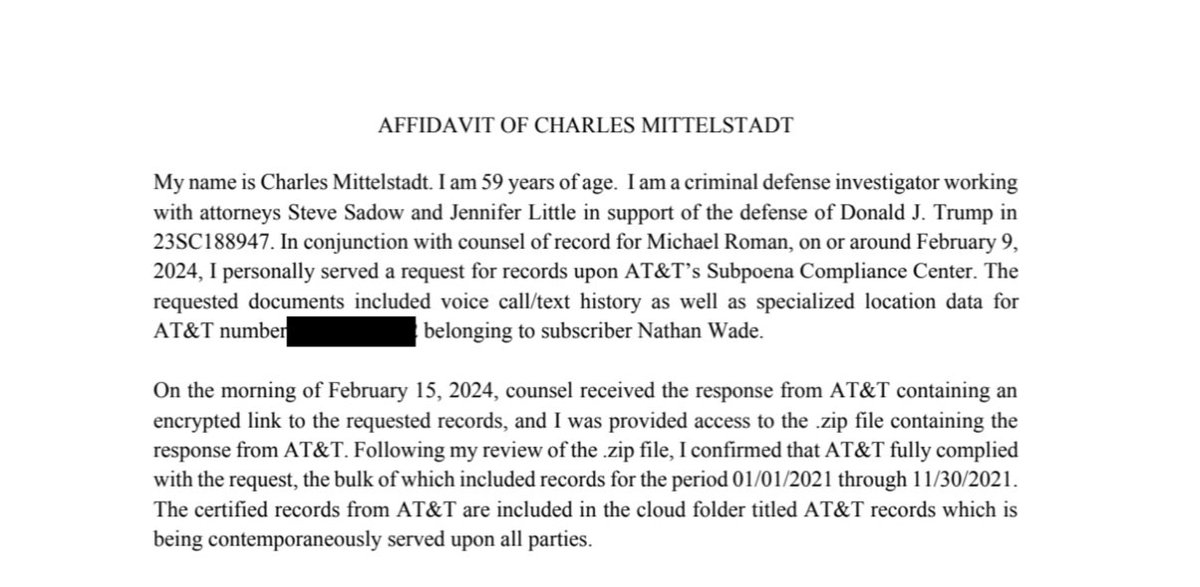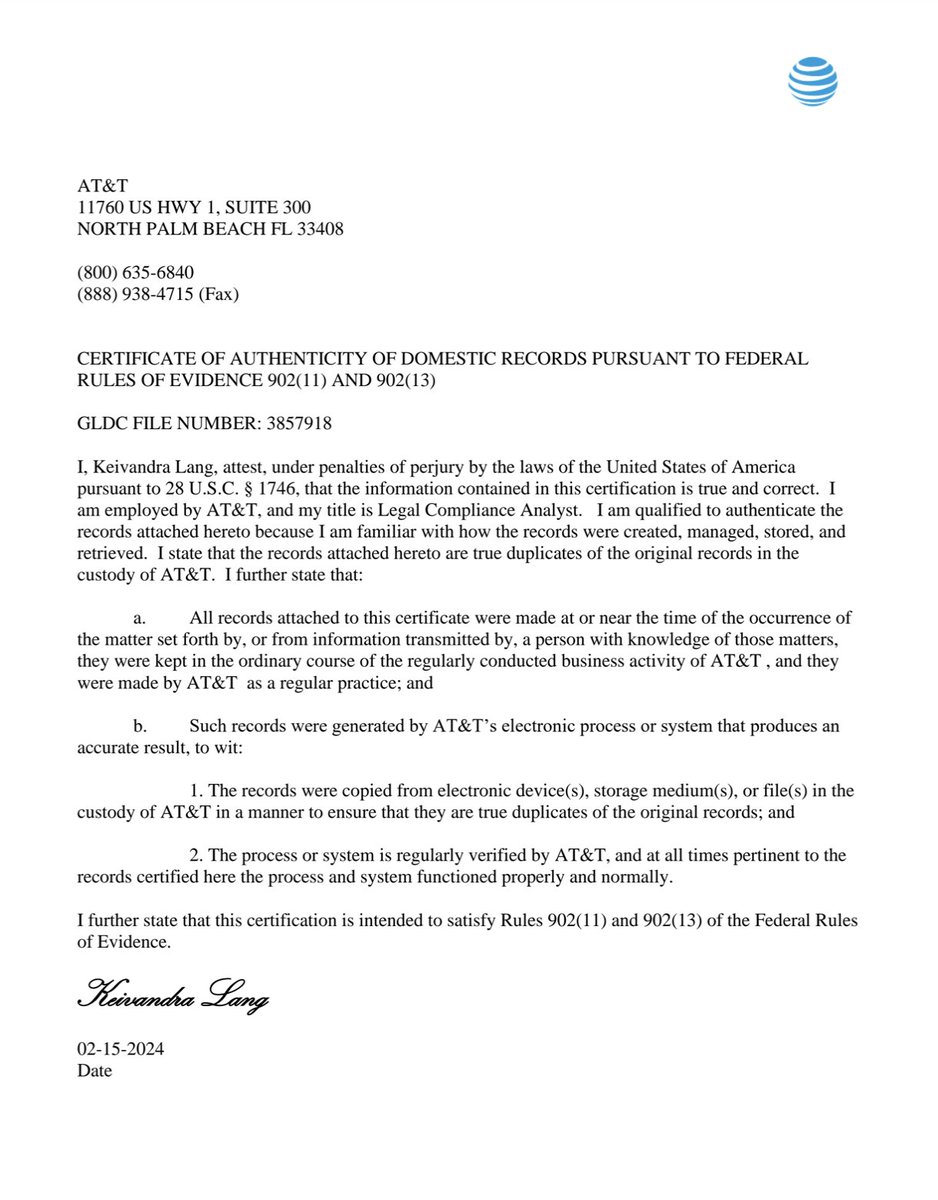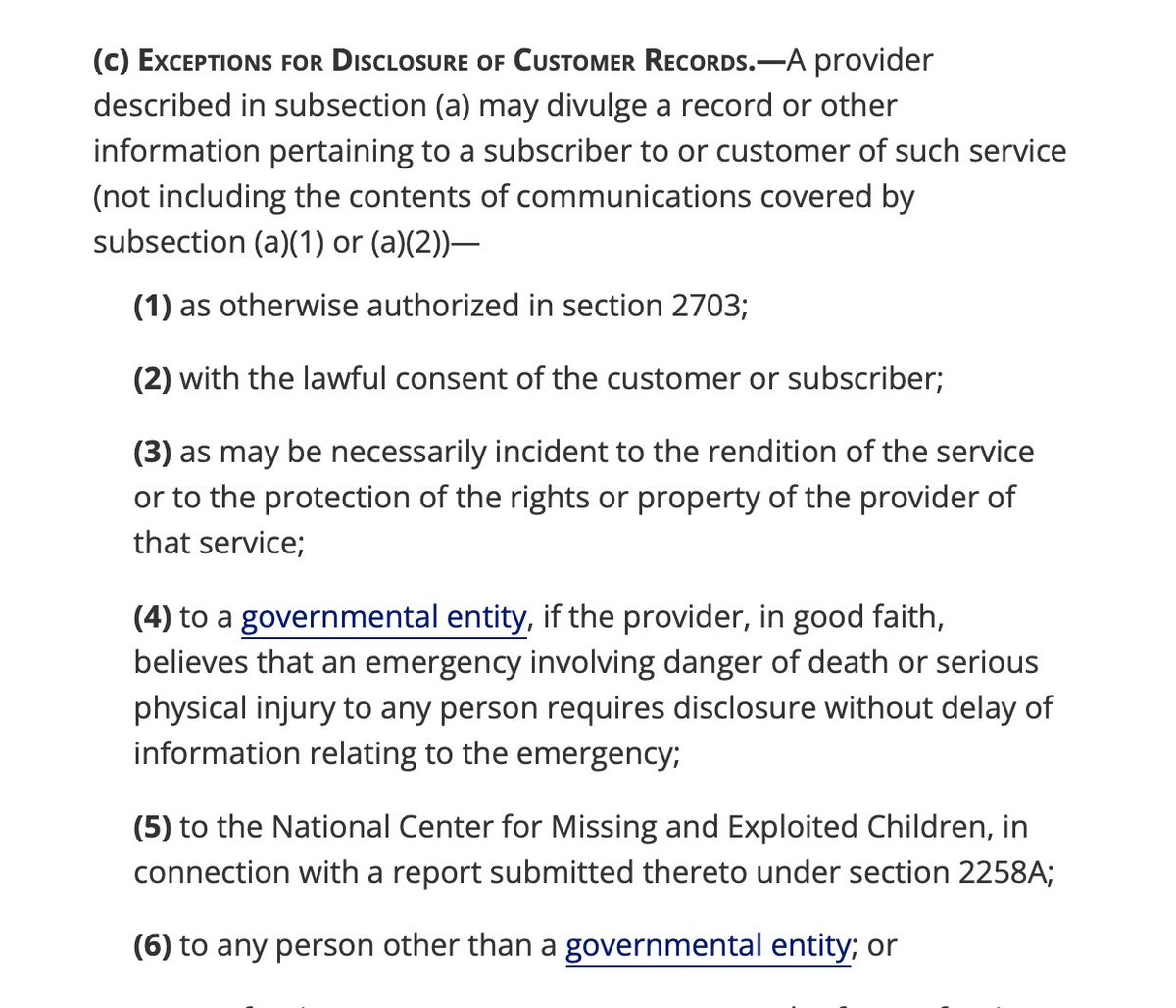How in the world did Trump’s defense attorneys obtain the phone records of prosecutor Nathan Wade?
Don’t they need a court-authorized warrant for that?
Did the divorce lawyer for Wade’s estranged wife have anything to do with this?
You’ve got questions, I’ve got answers.🧵
1/
Don’t they need a court-authorized warrant for that?
Did the divorce lawyer for Wade’s estranged wife have anything to do with this?
You’ve got questions, I’ve got answers.🧵
1/
Let’s start with how they got the phone records.
Last week, Mike Roman’s counsel, Ashleigh Merchant, told Judge McAfee that she sent a subpoena to Wade’s phone provider, AT&T, on or about Feb. 9.
That tracks with the affidavit of Trump and Roman’s private investigator.
2/


Last week, Mike Roman’s counsel, Ashleigh Merchant, told Judge McAfee that she sent a subpoena to Wade’s phone provider, AT&T, on or about Feb. 9.
That tracks with the affidavit of Trump and Roman’s private investigator.
2/


Some of you pointed out that the PI’s affidavit uses the term “request for records” rather than "subpoena."
But that’s just another way of saying “subpoena.”
I reached out to Roman’s counsel, Merchant, who told me that she signed a subpoena for the phone records.
3/
But that’s just another way of saying “subpoena.”
I reached out to Roman’s counsel, Merchant, who told me that she signed a subpoena for the phone records.
3/

The district attorney's office, for its part, hasn’t disputed the idea that the records were obtained pursuant to a subpoena.
4/
4/

Merchant also told me that her access to Wade’s phone records had nothing to do w/ his ongoing divorce case.
That tracks with the law: As a defense attorney for a client with an upcoming evidentiary hearing, Merchant herself would be able to send out subpoenas for documents. 5/
That tracks with the law: As a defense attorney for a client with an upcoming evidentiary hearing, Merchant herself would be able to send out subpoenas for documents. 5/

GA defense attorneys routinely issue subpoenas for phone records.
They just fill out the subpoena form & serve it on the phone carrier.
Typically, the carrier sends a notice to the person whose records are being subpoenaed.
That person can then move to quash the subpoena. 6/
They just fill out the subpoena form & serve it on the phone carrier.
Typically, the carrier sends a notice to the person whose records are being subpoenaed.
That person can then move to quash the subpoena. 6/
Did AT&T notify Wade about Merchant's request for his cell records? If it did, why didn’t Wade object or move to quash the subpoena?
I don’t know. And the state's brief doesn't shed much light on those issues.
But AT&T produced the records on Feb. 15.
7/
I don’t know. And the state's brief doesn't shed much light on those issues.
But AT&T produced the records on Feb. 15.
7/

Now, what about the state’s suggestion that Trump & co. needed a court-authorized search warrant backed by probable cause to lawfully obtain Wade’s phone records?
Isn’t that what the Fourth Amendment is all about?!
Well, no.
The state is wrong on this point.
8/
Isn’t that what the Fourth Amendment is all about?!
Well, no.
The state is wrong on this point.
8/

When the state—a government entity—seeks access to historic cell site location information from a phone carrier, they are required to obtain a court order backed by probable cause.
That principle comes from a Supreme Court case called Carpenter v. United States (2018).
9/
That principle comes from a Supreme Court case called Carpenter v. United States (2018).
9/
But the Fourth Amendment—and the decision in Carpenter—generally only applies against state actors.
What’s more, individuals generally have no reasonable expectation of privacy under the Fourth Amendment if they turn over information to a third party, like a phone carrier.
10/
What’s more, individuals generally have no reasonable expectation of privacy under the Fourth Amendment if they turn over information to a third party, like a phone carrier.
10/
So while the DA's office would generally need a warrant to lawfully obtain someone’s historical cell site location information under the Fourth Amendment, Ashleigh Merchant does not.
She's a criminal defense attorney, not a state actor.
11/
She's a criminal defense attorney, not a state actor.
11/
Beyond constitutional law, there are statutes that regulate what phone companies can turn over to third parties.
The Stored Communications Act, for example, provides protections against disclosure of the contents of customer communications—i.e., what you wrote in a text.
12/
The Stored Communications Act, for example, provides protections against disclosure of the contents of customer communications—i.e., what you wrote in a text.
12/
But the SCA distinguishes between “content” and “non-content” customer records.
Cell site location information is a “non-content” record.
The statute permits disclosure of such “non-content” customer records to non-governmental persons like Merchant. 18 USC 2702(c)(6).
13/
Cell site location information is a “non-content” record.
The statute permits disclosure of such “non-content” customer records to non-governmental persons like Merchant. 18 USC 2702(c)(6).
13/

Some of you asked about AT&T’s policies and whether the company followed that policy with respect to turning over Wade’s records.
I have no idea!
But if AT&T failed to abide by its internal policies, that doesn’t necessarily mean that the records were illegally obtained.
14/
I have no idea!
But if AT&T failed to abide by its internal policies, that doesn’t necessarily mean that the records were illegally obtained.
14/
Anyway, I know some folks have been surprised to learn how easy it is for criminal defense attorneys in Georgia to subpoena certain types of phone records.
While this thread is by no means exhaustive, I hope it clarifies some of the known facts and relevant law.
End?/
While this thread is by no means exhaustive, I hope it clarifies some of the known facts and relevant law.
End?/
On the question of AT&T policy, here’s a helpful 2022 letter written to the FCC by an AT&T executive on the subject of the company’s retention and sharing policies.
Thanks @petestrzok for finding this!
docs.fcc.gov/public/attachm…
Thanks @petestrzok for finding this!
docs.fcc.gov/public/attachm…
https://twitter.com/petestrzok/status/1761510416910352518
• • •
Missing some Tweet in this thread? You can try to
force a refresh













